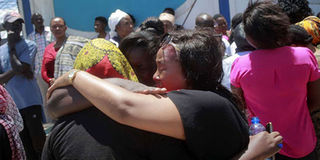After Likoni, it’s time to treat citizen safety more seriously

Friends and relatives of the mother and child who drowned after their vehicle slide off a ferry and fell into Indian Ocean on September 30, 2019 console each other. Senior officials should be prudent at their roles to be able to thwart disasters. PHOTO | FILE | NATION MEDIA GROUP
What you need to know:
- We do not need to wait until an accident occurs to set up a committee to form another committee while disasters go on unabated.
- So long as we continue with our corrupt ways of working and trading, we will suffer heavy human and financial losses.
It is 25 years since the last ferry disaster, at Mtongwe, Mombasa, that claimed more than 200 lives.
That ferry sank just metres from the headquarters of Kenya Navy, who were ill-prepared even then to come to the rescue of the commuters.
The recent incident at the Likoni Channel shows how few lessons have been learnt from Mtongwe as government agencies were, days later, still scrambling around to find the correct equipment and staff for the rescue mission.
As I write this, the bodies of Mariam Kighenda and her four-year-old daughter are yet to be retrieved from the seabed.
Two weeks before the Likoni accident, a storied classroom block at a private school collapsed on pupils in Dagoretti, Nairobi, killing at eight children.
It is not the first time — and I dread to say it will not be the last — to hear of buildings collapsing or accidents at sea, on land and in the sky.
NEGLIGENCE
We are accustomed to such chilling deaths. We usually shrug and carry on with life and, disturbingly, accept negligence as part of our genes.
It took the government four days to set up a rescue team, led by a Ministry of Transport Principal Secretary. To do what exactly?
Rescue and emergency plans are things that should have been part and parcel of governance and would have been up and running since independence.
We do not need to wait until an accident occurs to set up a committee to form another committee while disasters go on unabated.
The reality is that Kenya has become immune to man-made disasters — from road accidents to buildings collapsing and slums burning. And corruption is always in the mix of such disasters.
Counties such as Nairobi have witnessed numbers of poorly and illegally built apartments collapse and kill hundreds of residents. And this despite many promises made to fight corruption in the county and improve on building safety.
CORRUPTION
The Kenya Ferry Services (KFS), which is in charge of the Likoni ferry, has itself recently been implicated in corruption. The Auditor-General’s report released last year claimed that KFS failed to account for Sh5.4 billion!
That is enough money to build a few rescue centres with the latest gadgets and trained divers on both sides of the Likoni ferry crossing — but alas! Our apathy to safety is inherently linked to our tolerance for corruption.
It is hypocritical of us to appear surprised by avoidable deaths when we sit back and let corrupt officials reign in public offices. So long as we continue with our corrupt ways of working and trading, we will suffer heavy human and financial losses.
The school collapse claimed a few scalps in Nairobi. The owner of the school was arrested days after the incident following public outcry. This is commendable despite late action by the relevant authorities.
ACCOUNTABILITY
What we haven’t heard is reassurance that concrete measures were being taken to avoid a repeat of such cases. What the county and, indeed, the State has been silent about is who is responsible for such calamities.
A lot of blame game follows disasters, and we rarely see senior officials taken to task or even taking responsibility for systemic failures in their departments or ministries.
But the buck does, and always must, stop at the very top. It’s unfair to lay the blame at the door of junior officials when those who, in fact, slept on the job are the senior managers or elected leaders, who have a legal and fiduciary duty to make sure that systems work well.
Where were they as things went wrong? Had they sat in meetings and followed up on discrepancies in their organisations as and when required?
If the senior officials were prudent enough at their roles, they would have been able to react in good time to thwart disasters.
Most of our senior public officers, I believe, are under the impression that theirs is to keep passing the buck and blaming their juniors when things go wrong.
SAFETY STEPS
The final responsibility always lies at the very top, and we should start holding senior managers, including ministers and governors, responsible for disasters of this magnitude.
Citizen safety — be it in moving vehicles, at work, in stadiums, markets or even at home — must concern any government worth its votes.
A lot more than lip service and press conferences is needed to avert disasters. Long-lasting and sustainable measures need to be in place to mitigate them.
The safety of citizens should be a priority. It should not be the role of charities or international organisations to come to the rescue of citizens when governments have been voted in to ensure safety and security of everyone in Kenya.
Our leaders must start to realise that their appointment and election to office comes with responsibilities that need to be taken seriously. Should things go wrong, they should be prepared to pay the ultimate price.
Ms Guyo is a legal researcher. [email protected] @kdiguyo





